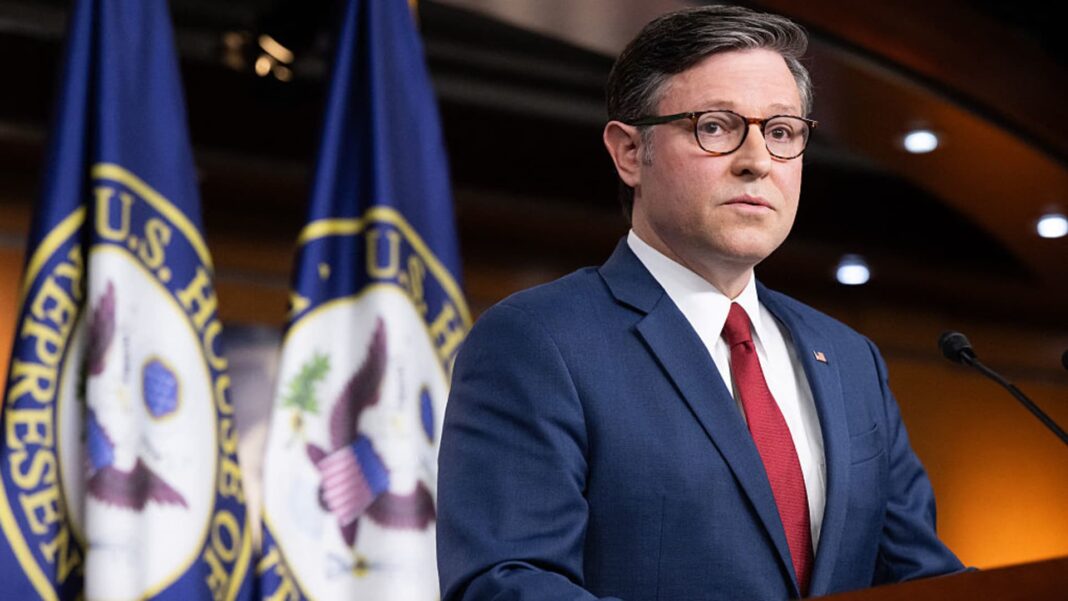US Speaker of the House Mike Johnson, Republican from Louisiana, speaks during a news conference on day 41 of the federal government shutdown, at the US Capitol on November 10, 2025, in Washington, DC.
Saul Loeb | Afp | Getty Images
The Senate on Monday night passed a bill to fund the government and end the longest shutdown in U.S. history.
The bill, which passed 60-40 with the support of a handful of Democratic senators and nearly all Republicans, will be sent to the House of Representatives.
If it passes in both chambers of Congress, it will head to President Donald Trump to be signed into law. Trump said earlier Monday that he approves the funding deal, which was negotiated between Republicans and a gang of moderate Senate Democrats, as it currently stands.
But House Speaker Mike Johnson, R-La., added uncertainty to the fate of the deal when he refused to commit to a key guarantee in the deal, of assuring Democrats that Congress will hold a separate vote in December on potentially extending enhanced Affordable Care Act subsidies.
“I’m not committing to it or not committing to it,” Johnson said on CNN.
Johnson on Monday called for House members to begin traveling to Washington, D.C., so that they can vote as soon as possible on the Senate deal.
Johnson spoke to reporters a day after the Senate narrowly approved the first stage of the deal to reopen the government, which shut down on Oct. 1.
Johnson indicated to reporters that he expected votes in the House to occur this week, but he did not state a specific day. He later told the Republican House conference during a call that he would like the vote to occur on Wednesday, according to a person familiar with the situation.
The speaker said he would issue an official 36-hour notice before the House votes.
Johnson said, “There’ll be long days and long nights here for the foreseeable future to make up for all this lost time that was imposed upon us.”
Johnson has kept the House out of session since it passed a continuing resolution in September to fund the government through mid-November.
A vote to advance the Senate deal, forged over the weekend, drew support from seven Democrats and one independent who caucuses with Democrats. Those votes, combined with the support of 52 Republican senators, was enough to reach a 60-vote threshold to pass.
The deal does not include what had been the key demand for Democrats: an extension of enhanced Affordable Care Act tax credits, which are due to expire at the end of December.
But the agreement, for the first time since the shutdown began, includes a guarantee by Republicans of a vote in December on a bill chosen by Democrats to extend those subsidies, which more than 20 million Americans use to reduce the cost of health insurance plans purchased on ACA marketplaces.
The Senate deal would fund the government through the end of January; reverse all shutdown-related layoffs of federal employees; and guarantee that all federal workers will be paid their normal salaries during the shutdown.
The deal also includes provisions for a bipartisan budget process and prevents the White House from using continuing resolutions to fund the government. CRs have been repeatedly used to avoid government shutdown, but are controversial because they frequently avoid lawmakers having to make decisions about long-term funding of the government that a normal budget would resolve.
The deal would also fund, through September, the SNAP program, which helps feed 42 million Americans through food stamps.
Under a federal law passed in 2019, government employees who are furloughed during a shutdown must be paid for the time they were out of work at their standard rate of pay “at the earliest date possible, regardless of scheduled pay dates.”
— CNBC’s Emily Wilkins contributed to this story.


